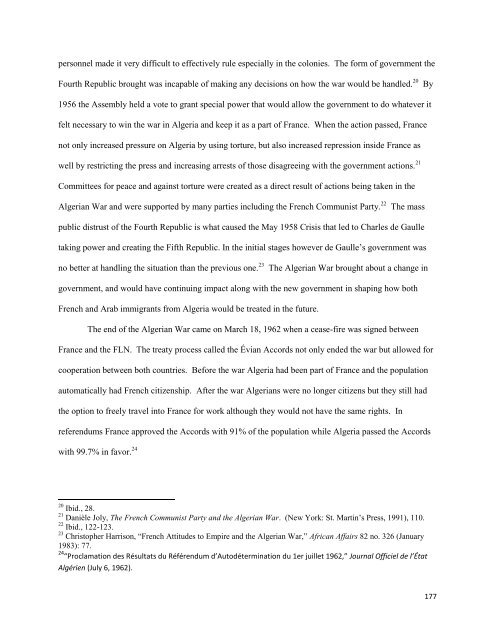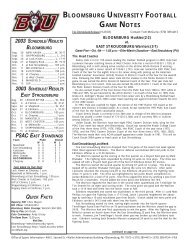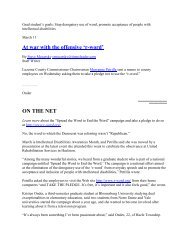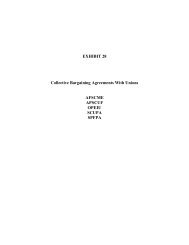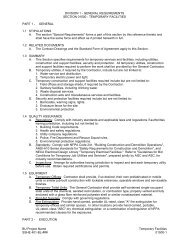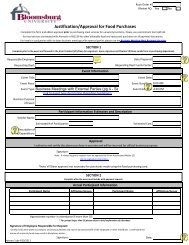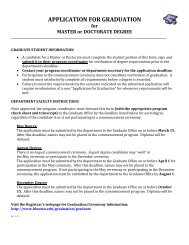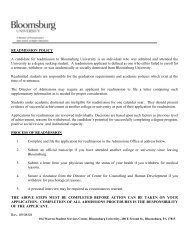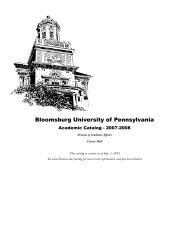Human Rights at Home and Abroad: Past, Present, and Future
Human Rights at Home and Abroad: Past, Present, and Future
Human Rights at Home and Abroad: Past, Present, and Future
You also want an ePaper? Increase the reach of your titles
YUMPU automatically turns print PDFs into web optimized ePapers that Google loves.
personnel made it very difficult to effectively rule especially in the colonies. The form of government the<br />
Fourth Republic brought was incapable of making any decisions on how the war would be h<strong>and</strong>led. 20 By<br />
1956 the Assembly held a vote to grant special power th<strong>at</strong> would allow the government to do wh<strong>at</strong>ever it<br />
felt necessary to win the war in Algeria <strong>and</strong> keep it as a part of France. When the action passed, France<br />
not only increased pressure on Algeria by using torture, but also increased repression inside France as<br />
well by restricting the press <strong>and</strong> increasing arrests of those disagreeing with the government actions. 21<br />
Committees for peace <strong>and</strong> against torture were cre<strong>at</strong>ed as a direct result of actions being taken in the<br />
Algerian War <strong>and</strong> were supported by many parties including the French Communist Party. 22 The mass<br />
public distrust of the Fourth Republic is wh<strong>at</strong> caused the May 1958 Crisis th<strong>at</strong> led to Charles de Gaulle<br />
taking power <strong>and</strong> cre<strong>at</strong>ing the Fifth Republic. In the initial stages however de Gaulle‘s government was<br />
no better <strong>at</strong> h<strong>and</strong>ling the situ<strong>at</strong>ion than the previous one. 23 The Algerian War brought about a change in<br />
government, <strong>and</strong> would have continuing impact along with the new government in shaping how both<br />
French <strong>and</strong> Arab immigrants from Algeria would be tre<strong>at</strong>ed in the future.<br />
The end of the Algerian War came on March 18, 1962 when a cease-fire was signed between<br />
France <strong>and</strong> the FLN. The tre<strong>at</strong>y process called the Évian Accords not only ended the war but allowed for<br />
cooper<strong>at</strong>ion between both countries. Before the war Algeria had been part of France <strong>and</strong> the popul<strong>at</strong>ion<br />
autom<strong>at</strong>ically had French citizenship. After the war Algerians were no longer citizens but they still had<br />
the option to freely travel into France for work although they would not have the same rights. In<br />
referendums France approved the Accords with 91% of the popul<strong>at</strong>ion while Algeria passed the Accords<br />
with 99.7% in favor. 24<br />
20 Ibid., 28.<br />
21 Danièle Joly, The French Communist Party <strong>and</strong> the Algerian War. (New York: St. Martin‘s Press, 1991), 110.<br />
22 Ibid., 122-123.<br />
23 Christopher Harrison, ―French Attitudes to Empire <strong>and</strong> the Algerian War,‖ African Affairs 82 no. 326 (January<br />
1983): 77.<br />
24 “Proclam<strong>at</strong>ion des Résult<strong>at</strong>s du Référendum d’Autodétermin<strong>at</strong>ion du 1er juillet 1962,” Journal Officiel de l’Ét<strong>at</strong><br />
Algérien (July 6, 1962).<br />
177


